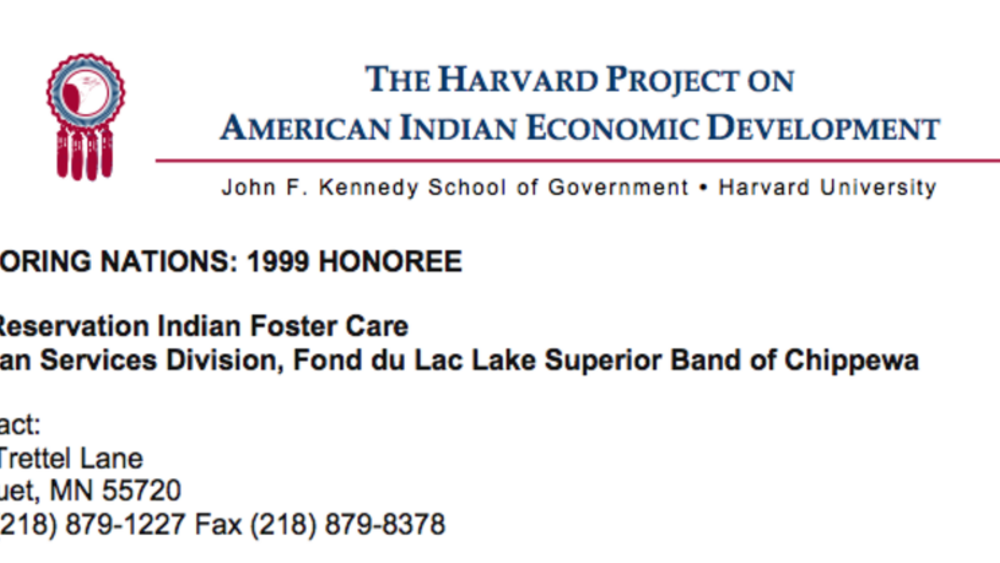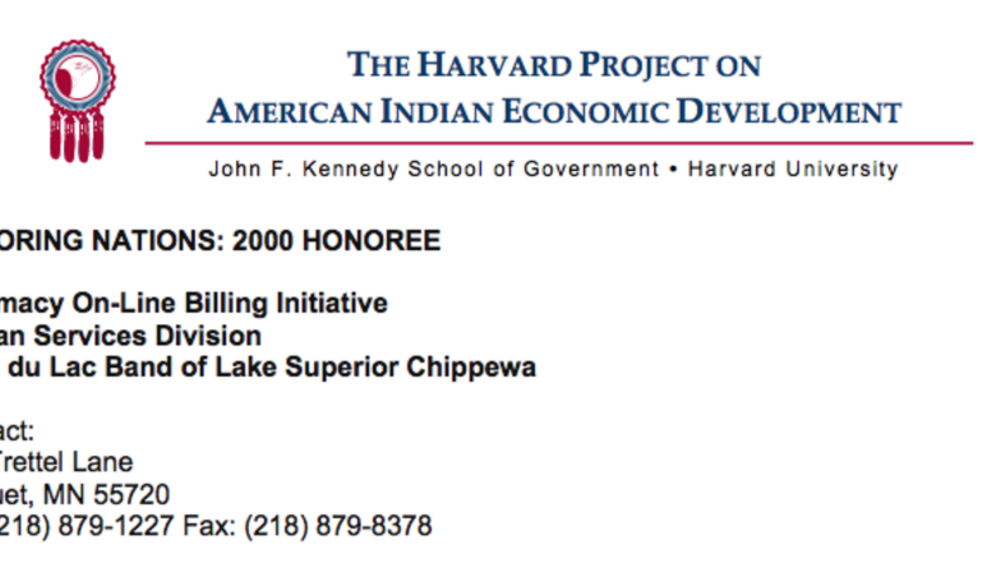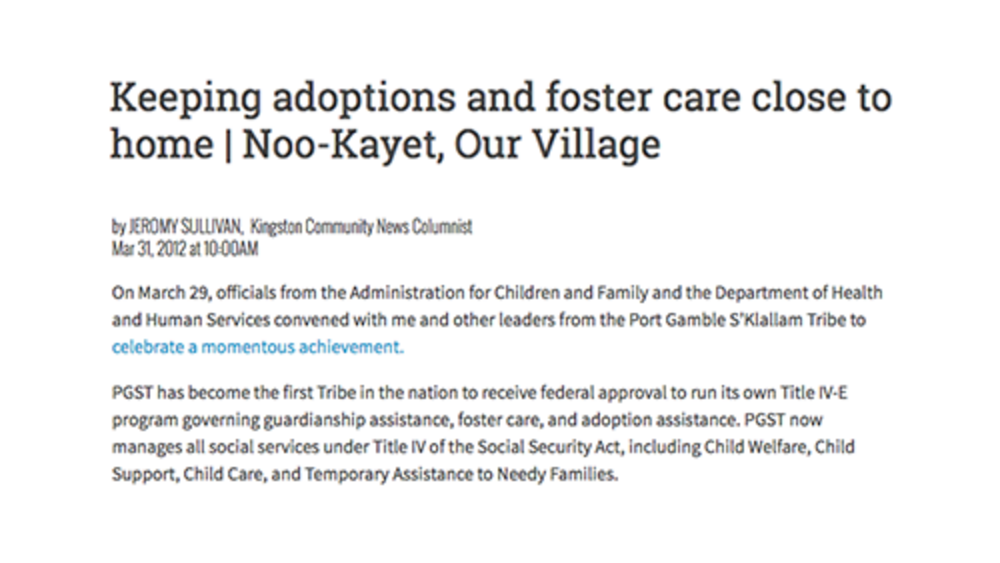Julia "Bunny" Jaakola shares how the Fond du Lac Band of Lake Superior Chippewa turned sovereignty into a practical reality through leadership, community engagement, and collaboration with outside entities.
Additional Information
Jaakola, Julia "Bunny." "Turning Sovereignty into a Practical Reality: The Fond du Lac Band of Lake Superior Chippewa." Honoring Nations symposium. Harvard Project on American Indian Economic Development, John F. Kennedy School of Government, Harvard University. Sante Fe, New Mexico. February 7, 2002. Presentation.
Transcript
Andrew Lee:
"The first person I would like to introduce -- comes from the Fond du Lac Band of Lake Superior Chippewa -- is Bunny Jaakola. If you don't know, the Fond du Lac Band has won a number of awards, both in 1999 and in 2000, in 1999 for their off-reservation Indian foster care program that Bunny is involved with, and also in 2000 for their pharmacy online billing initiative. I don't know whether you're going to be discussing both in particular, but she certainly has a great deal of knowledge about 'How to Turn Sovereignty into a Practical Reality.' Welcome, Bunny."
Julia "Bunny" Jaakola:
"Thank you very much. It's a real privilege to be here. I thought that I was going to come and see some mild, nice weather coming from Minnesota, because we have a shortage of snow there. We're not having normal winter weather at all. But it's real nice being here in the sun. I'm Bunny Jaakola. I'm from the Fond du Lac Band of Minnesota Chippewa in northern Minnesota, and I work as the coordinator of social services for the tribe. I've been there almost 15 years now. I've been in the tribe a lot longer than that.
Fond du Lac has an enrollment of about 3,500 people and has grown to be the largest employer within the county of about 30,000 people. We have two casinos, one of which is in downtown Duluth. This came about as a partnership between the Band and the city council and continues to be a profitable endeavor.
Our chairman, Robert Peacock, sends his regards and regrets that he couldn't be here. I can also tell you that the chairman is very proud of the accomplishments of the staff at Fond du Lac. It's through his leadership and the support of other council members that we have been able to do what we do. A good idea for growth and development receives the attention necessary to proceed. The leaders recognized the merits of community input to determine needs, and that allows the workers to turn those needs into goals. These goals eventually become the actual steps in the overall development of services for our Indian people. Trust in the people who are hired to carry out such plans has been the impetus that retains long-term employees and nurtures the commitment to continue such projects.
Our leaders have acknowledged and continue to promote the value of working closely with the county and state neighbors to address some very hard issues, while not giving up our sovereignty. Collaboration is the key for Fond du Lac and the Minnesota conservation departments to establish hunting and fishing practices that are fair to everyone and yet retain the tribal rights of Indian people. The Fond du Lac education division strives to work closely with the public school systems and yet develop an American Indian educational system that will retain cultural values, traditions, and provide a better understanding for children of our very valuable history. Fond du Lac is also successfully carving out a tribal law enforcement program that will be able to work in conjunction with county, city, and state police. Efforts are currently at work to develop community response programs to provide options for the county court judges that will give a first or early Indian offender an opportunity for rehabilitation rather than jail time. The tentative plan requires no additional staff, nor additional funding.
More specifically to the human service division, a partnership was formed in 1994 with St. Louis County to provide Families First services to the Indian people who reside in Duluth -- and Duluth is about 25 miles away from our reservation. We have a contract with Arrowhead Juvenile Center since 1998 to provide an Indian employee to work with the Indian youth who are incarcerated there, trying to reduce the recidivism rate of the kids who are incarcerated. We have a contract with Carlton County that has been renewed each year since 1996 to maintain an on-reservation foster care program. We are just completing three years of contracts with the Duluth Family Collaborative to employee two social workers who provide wrap-around services to the Duluth Indian families.
The support I receive from Fond du Lac leadership has made it possible for me to actively participate in seven long years of the development, negotiation, and finally, the eventual signing of a tribal-state child welfare agreement with the State of Minnesota. The signing of this agreement has finally begun to change the ways counties are handling Indian child welfare cases in the state. The agreement provides four major opportunities for a better working relationship between the state and the 11 tribes in the state. They are, number one, ICWA training for all new child protection workers in the state. Two, it opens the door for additional contracts with the tribes, with counties, with the state. Three, it provides additional legislative input for tribal child welfare. Four, it instituted an eight-member ICWA compliance review team to monitor ICWA cases throughout the state.
One of the successful projects specific to Fond du Lac is the Fond du Lac Licensing and Placement Agency, which earned an Honoring Nations award in 1999. The success for the foster care program is that we were able to resolve both the jurisdictional questions and increase the number of Indian families interested in providing substitute care for those Indian children when necessary. It's a plain fact that Indian people work better with Indian providers. Because the jurisdiction laws of the state prohibit tribes from licensing off the reservation, we found a way to extend the sovereignty with full cooperation from the state. A corporation was formed and consists of Indian employees and other interested Indian people, including one tribal council member. A contract was developed and signed between this corporation and the reservation business committee. All personnel and accounting services are provided for the corporation by the tribe through this contract. In essence, you would call the corporation a step organization of the Fond du Lac Band. This program is also unusual because the corporation is licensed by the State of Minnesota. You can see how the program is actually an extension of sovereignty outside reservation boundaries. Through this contract, Fond du Lac employees have been able to impact the placements of Indian children in foster care all over northern Minnesota and further empower our existing structure.
Prior to the establishment of this arrangement, counties had few and some had no Indian foster homes. Counties had great difficulty recruiting Indian people for a variety of reasons, historical mistrust being the most obvious. This could be used as a convenient reason for not placing Indian children with Indian families as the Indian Child Welfare Act requires. It was also a lucrative income for existing foster parents, given the number of children that were being removed in the past. Since our start-up about 10 years ago, we have placed nearly 500 children in these Indian homes and provided about $3.5 million to Indian foster care providers. The future is bright for Fond du Lac's social services with our current ability to be reimbursed for the targeted case management that we've been doing since 1980, actually. Through successful negotiation by individuals committed to Indian people and a positive partnership with state employees, the road has been paved for tribes in Minnesota to finance their own social service departments in this manner. This is something that's just getting started, being reimbursed for target case management.
The award that was given to Fond du Lac in the year 2000 was the Pharmacy Online Billing Initiative. I don't know that much about the computer world but I will try to be brief to give a better description of what that project was. The resource patient management system, or the RPMS, is the existing Indian Health Service tool for the collection of data for all tribal accounts. This system has no capacity for billing. In time of rising costs and third-party payers, Fond du Lac recognized the need to change the system. The people at the human services department, or division, applied for and [were] awarded an IHS tribal management grant to attack just this problem. With the grant, Fond du Lac was able to purchase a computerized system for billing and record-keeping. A vendor was found for the development of the software that was actually implemented. Within a year we had an online pharmacy billing system that was compatible with the Indian Health Service and served the financial needs of Fond du Lac very well. The reality is that very soon after a check was received for $625,000 dollars that represented allowable billing for pharmaceuticals at Fond du Lac. This is a successful project that can be and is being replicated by other tribes. Some of the more tangible benefits that come from that particular project is an expanded pharmacy program, an optometry clinic for the Indian people in our area, a summer day camp for at least 120 kids all summer from early June until the end of August.
A few of the words I used to describe Fond du Lac are the following: We have people who have a vision; it's radar. They have that radar out there and they listen for ideas and they push to get them into place. Collaboration, negotiation and the nurturing of relationships, respect and trust, acknowledgement of existing limitations; knowing what we're not going to give away, knowing what the other party is not going to give away and working from there. Investment in membership equals long-term, committed workers. Building and nurturing a rapport with key people not only locally, but statewide and nationally. Development of resources for funding in partnerships, engaging participants in the actual planning, and thinking outside the box."



